外研版(2019)必修第三册 Unit3 The world of science Starting out& Listening课件 (共25张PPT,内嵌音频)
文档属性
| 名称 | 外研版(2019)必修第三册 Unit3 The world of science Starting out& Listening课件 (共25张PPT,内嵌音频) | 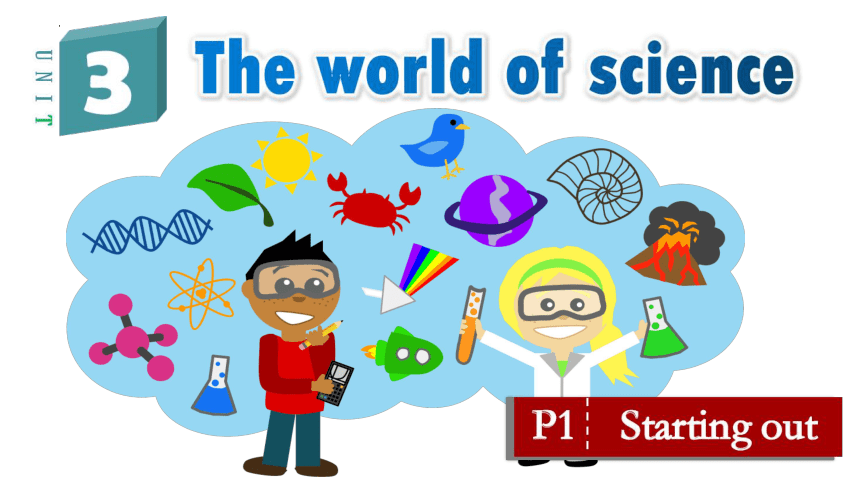 | |
| 格式 | pptx | ||
| 文件大小 | 13.4MB | ||
| 资源类型 | 教案 | ||
| 版本资源 | 外研版(2019) | ||
| 科目 | 英语 | ||
| 更新时间 | 2023-09-20 19:55:19 | ||
图片预览

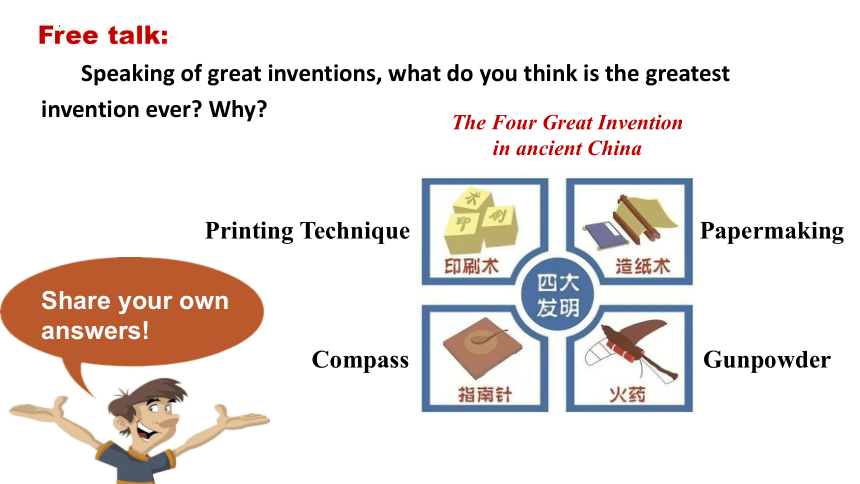
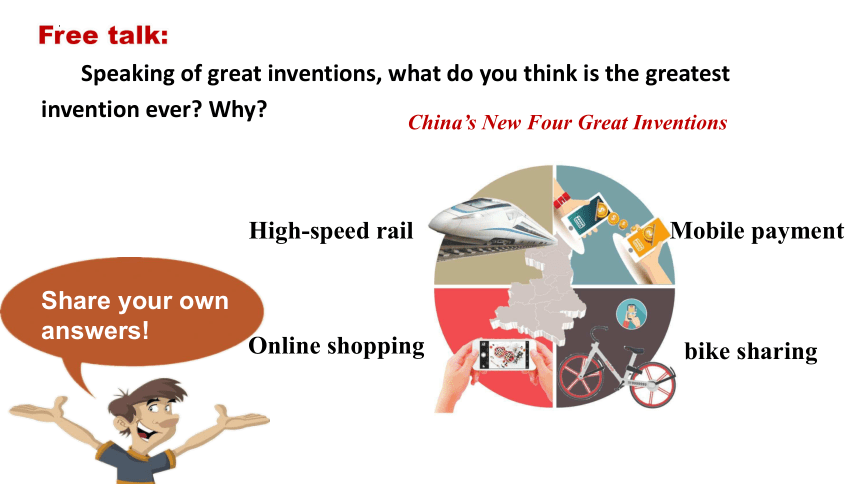
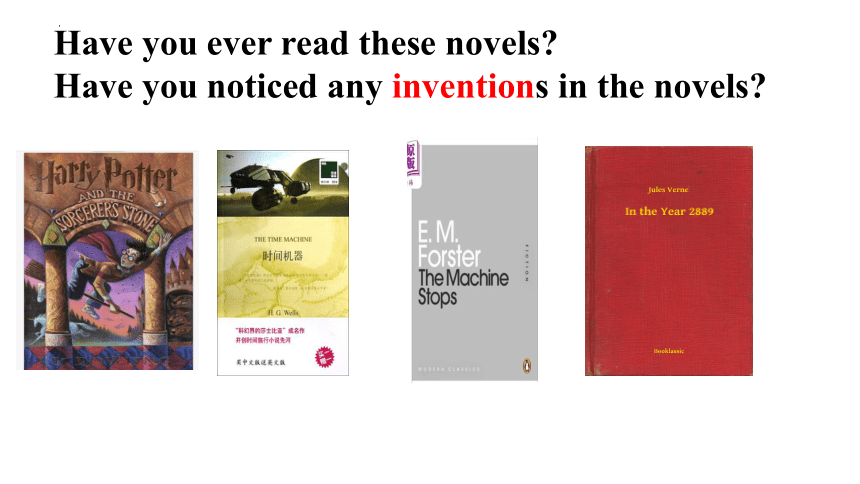
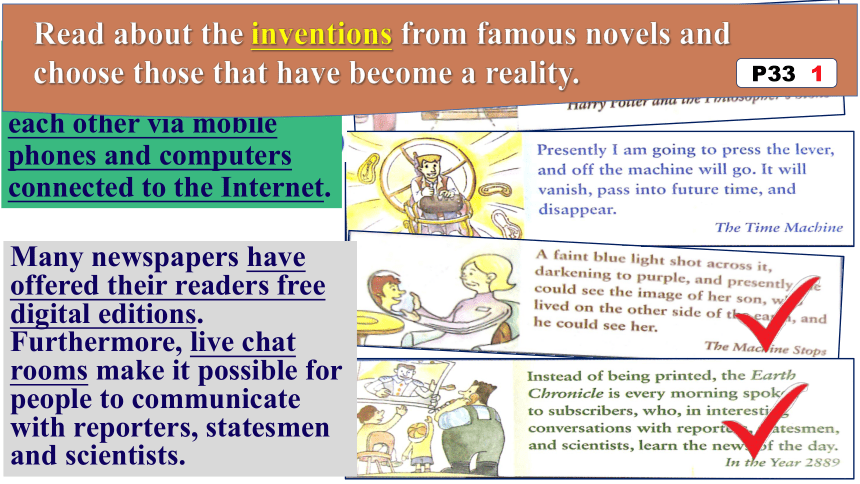
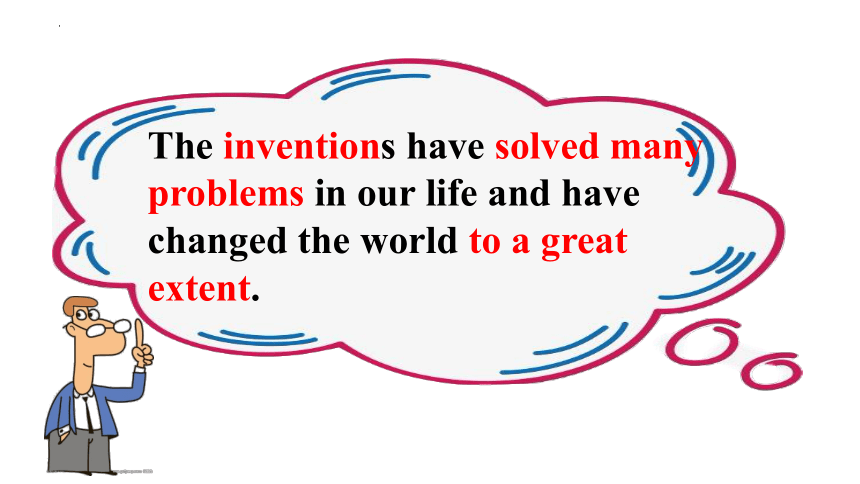
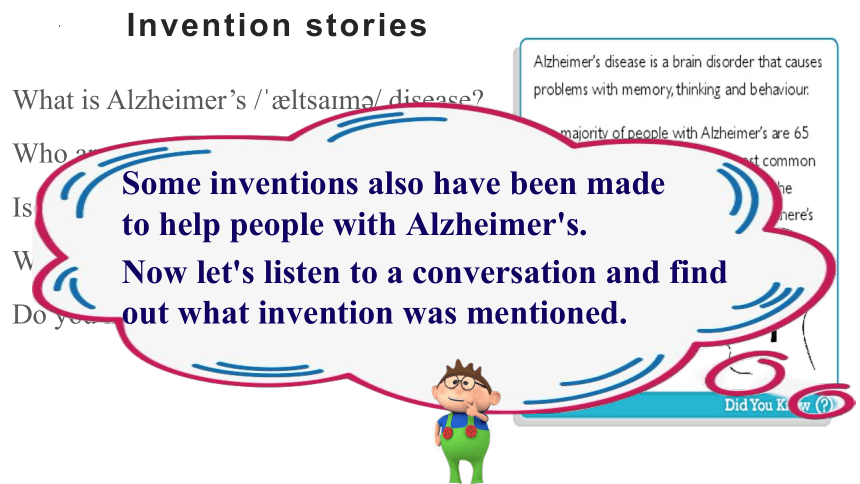
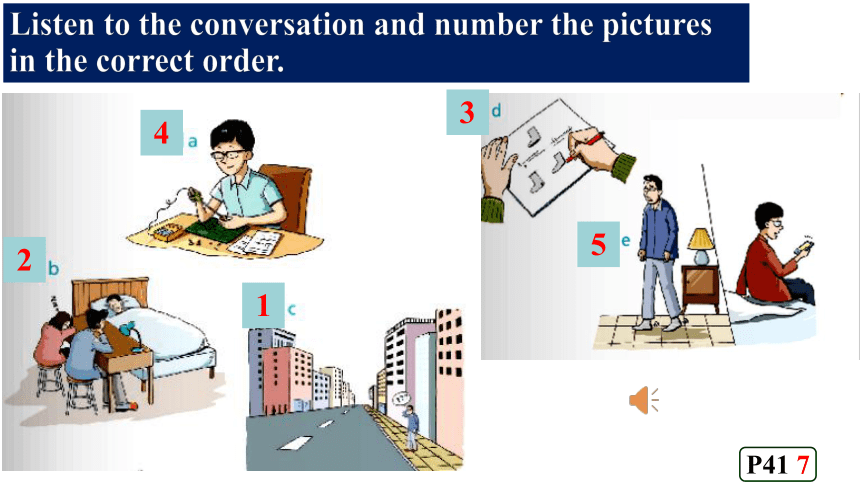
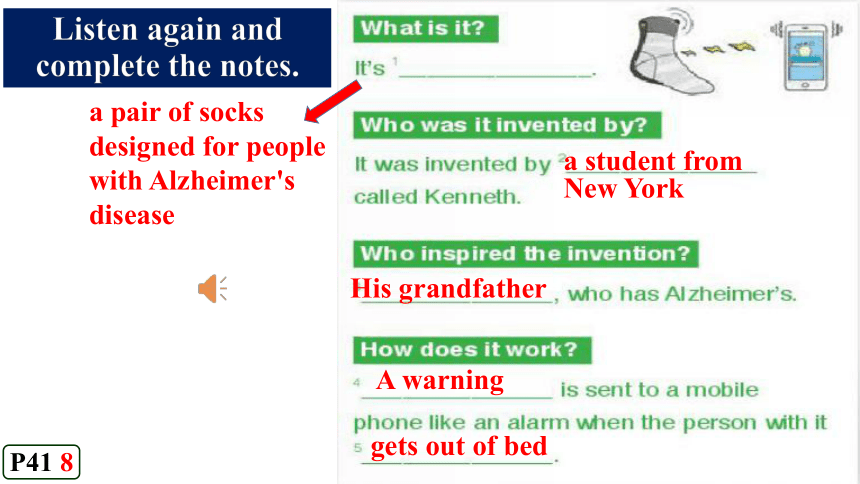
文档简介
(共25张PPT)
Share your own answers!
Free talk:
Speaking of great inventions, what do you think is the greatest invention ever Why
The Four Great Invention
in ancient China
Gunpowder
Compass
Papermaking
Printing Technique
Share your own answers!
Free talk:
Speaking of great inventions, what do you think is the greatest invention ever Why
China’s New Four Great Inventions
Online shopping
High-speed rail
Mobile payment
bike sharing
Have you ever read these novels
Have you noticed any inventions in the novels
People nowadays can have video chats with each other via mobile phones and computers connected to the Internet.
Read about the inventions from famous novels and choose those that have become a reality.
P33 1
Many newspapers have offered their readers free digital editions. Furthermore, live chat rooms make it possible for people to communicate with reporters, statesmen and scientists.
The inventions have solved many problems in our life and have changed the world to a great extent.
Invention stories
What is Alzheimer’s / ltsa m / disease
Who are the common Alzheimer patients
Is it curable
What are scientists trying to deal with it
Do you know any inventions related to it
Some inventions also have been made to help people with Alzheimer's.
Now let's listen to a conversation and find out what invention was mentioned.
Listen to the conversation and number the pictures in the correct order.
1
2
3
4
5
P41 7
a pair of socks designed for people with Alzheimer's disease
a student from New York
His grandfather
A warning
gets out of bed
Listen again and complete the notes.
P41 8
Tapescript
Check your answers!
1
2
3
4-5
1. Which of the inventions in the video interests you most Why
2. Which of the inventions in the video do you think will become a reality
P33 2
Watch the video and answer the questions.
take a pill to make us small enough to explore cells
wear special clothes that can change
Our car will be able to fly and go underwater.
go on holiday to other planets
understand and speak to everyone when traveling abroad
cure diseases like cancer and AIDS easily
live for more than 120 years
Tapescript:
Of all the inventions in the world, which do you think is the most useful Why
P33 2
2. 3D-printed hamburgers have been served to customers in some restaurants in London.
3. But perhaps the most significant success that has been achieved to date is in medicine.
4. Human body parts, including a beating heart, have been made with 3D printing technology.
5. A new 3D-printed shell has been given to a turtle injured in a forest fire!
Rewrite the underlined parts using the present perfect passive.
P38 2
1. Many things in our lives have already been affected.
1
2
3
4
5
Imagine you are Dr Moore. Look at the pictures and tell the police about the damage and loss to your lab. Use the present perfect passive where appropriate.
P39 3
My lab has been broken into.
The lock on the door has been broken.
The window has been broken.
My two laptops have been stolen.
Beakers and test tubes have been destroyed.
The book case has been opened, and some files have been taken away while others have been thrown everywhere.
The robot has been damaged.
Look at the pictures and answer the question.
What do you know about these careers
A physicist(物理学家) is a person who does research connected with physics or who studies physics.
A mathematician(数学家) is a person who is trained in the study of numbers and calculations.
A chemist(化学家) is a person who does research connected with chemistry or who studies chemistry.
An astronomer(天文学家) is a scientist who studies the stars, planets, and other natural objects in space.
P39 4
A geographer(地理学家) is a person who studies geography or is an expert in it.
A biologist(生物学家) is a person who studies or works in the field of biology.
□ Learning to learn
Words about different careers in science can be formed by adding -er, -ist or -ian at the end of the words about subjects, eg biology - biologist.
Complete the introductions about different scientists with the words in Activity 4. Pay attention to the language that describes their careers.
P40 5
astronomer
biologist
physicist
mathematician
chemist
astronomer geographer
biologist
P40 5
physicist
chemist
mathematicians
geographer
physicist
mathematician
chemist
astronomer geographer
biologist
Think about other careers in science and discuss what interests you most.
I'm interested in the work of a(n)... because...
P40 6
Work in pairs.
◆geologist (地质学家)
◆data analyst (数据分析师)
◆software engineer (软件工程师)
◆environmental engineer
◆pharmacist (药剂师)
Possible words:
Observe the underlined sentences below.
□ Learning to learn
Exclamatory sentences express strong emotions, such as surprise, shock, joy, emphasis and excitement. These are usually formed with what or how, and in written form usually end with an exclamation mark.
● What is the invention
● Who was it invented by
● Why was it invented Or who inspired the invention
● How does it work
...
Now talk about how the speakers describe the story behind an invention. Listen again if necessary.
You are going to give a presentation about the invention of the telephone. As part of your research, you speak to Student B who has just read a book about it. Ask him/her questions to find out more information. Information you'd like to know:
You've just read a book about the invention of the telephone. Student A, who is going to give a presentation on the same topic, ask you for information.
Student A
Student B
◆ the inventor
◆ year of invention
◆ the inventing process
◆ the first phone call
◆ other interesting things about the invention
Inventor: Alexander Graham Bell
Invention created in: 1876
Background: Bell was a teacher at a school for the deaf. He tried to invent a machine to send messages over an electronic wire. This eventually led to the idea of a telephone. Later, with his assistant, he created a device to produce and receive sound waves using electrical signals.
First phone call: On 10 March 1876, Bell made the first clear and complete phone call to his assistant, saying, “Mr Watson- come here - I want to see you.”
Other information: Bell never had a telephone in his study, where he wanted to be alone with his thoughts and work.
Work in pairs. Act out the conversation about the invention of the telephone.
P41 9
Work in pairs. Choose another story of an invention you know and have a similar conversation (P41 10).
Share your own answers!
Free talk:
Speaking of great inventions, what do you think is the greatest invention ever Why
The Four Great Invention
in ancient China
Gunpowder
Compass
Papermaking
Printing Technique
Share your own answers!
Free talk:
Speaking of great inventions, what do you think is the greatest invention ever Why
China’s New Four Great Inventions
Online shopping
High-speed rail
Mobile payment
bike sharing
Have you ever read these novels
Have you noticed any inventions in the novels
People nowadays can have video chats with each other via mobile phones and computers connected to the Internet.
Read about the inventions from famous novels and choose those that have become a reality.
P33 1
Many newspapers have offered their readers free digital editions. Furthermore, live chat rooms make it possible for people to communicate with reporters, statesmen and scientists.
The inventions have solved many problems in our life and have changed the world to a great extent.
Invention stories
What is Alzheimer’s / ltsa m / disease
Who are the common Alzheimer patients
Is it curable
What are scientists trying to deal with it
Do you know any inventions related to it
Some inventions also have been made to help people with Alzheimer's.
Now let's listen to a conversation and find out what invention was mentioned.
Listen to the conversation and number the pictures in the correct order.
1
2
3
4
5
P41 7
a pair of socks designed for people with Alzheimer's disease
a student from New York
His grandfather
A warning
gets out of bed
Listen again and complete the notes.
P41 8
Tapescript
Check your answers!
1
2
3
4-5
1. Which of the inventions in the video interests you most Why
2. Which of the inventions in the video do you think will become a reality
P33 2
Watch the video and answer the questions.
take a pill to make us small enough to explore cells
wear special clothes that can change
Our car will be able to fly and go underwater.
go on holiday to other planets
understand and speak to everyone when traveling abroad
cure diseases like cancer and AIDS easily
live for more than 120 years
Tapescript:
Of all the inventions in the world, which do you think is the most useful Why
P33 2
2. 3D-printed hamburgers have been served to customers in some restaurants in London.
3. But perhaps the most significant success that has been achieved to date is in medicine.
4. Human body parts, including a beating heart, have been made with 3D printing technology.
5. A new 3D-printed shell has been given to a turtle injured in a forest fire!
Rewrite the underlined parts using the present perfect passive.
P38 2
1. Many things in our lives have already been affected.
1
2
3
4
5
Imagine you are Dr Moore. Look at the pictures and tell the police about the damage and loss to your lab. Use the present perfect passive where appropriate.
P39 3
My lab has been broken into.
The lock on the door has been broken.
The window has been broken.
My two laptops have been stolen.
Beakers and test tubes have been destroyed.
The book case has been opened, and some files have been taken away while others have been thrown everywhere.
The robot has been damaged.
Look at the pictures and answer the question.
What do you know about these careers
A physicist(物理学家) is a person who does research connected with physics or who studies physics.
A mathematician(数学家) is a person who is trained in the study of numbers and calculations.
A chemist(化学家) is a person who does research connected with chemistry or who studies chemistry.
An astronomer(天文学家) is a scientist who studies the stars, planets, and other natural objects in space.
P39 4
A geographer(地理学家) is a person who studies geography or is an expert in it.
A biologist(生物学家) is a person who studies or works in the field of biology.
□ Learning to learn
Words about different careers in science can be formed by adding -er, -ist or -ian at the end of the words about subjects, eg biology - biologist.
Complete the introductions about different scientists with the words in Activity 4. Pay attention to the language that describes their careers.
P40 5
astronomer
biologist
physicist
mathematician
chemist
astronomer geographer
biologist
P40 5
physicist
chemist
mathematicians
geographer
physicist
mathematician
chemist
astronomer geographer
biologist
Think about other careers in science and discuss what interests you most.
I'm interested in the work of a(n)... because...
P40 6
Work in pairs.
◆geologist (地质学家)
◆data analyst (数据分析师)
◆software engineer (软件工程师)
◆environmental engineer
◆pharmacist (药剂师)
Possible words:
Observe the underlined sentences below.
□ Learning to learn
Exclamatory sentences express strong emotions, such as surprise, shock, joy, emphasis and excitement. These are usually formed with what or how, and in written form usually end with an exclamation mark.
● What is the invention
● Who was it invented by
● Why was it invented Or who inspired the invention
● How does it work
...
Now talk about how the speakers describe the story behind an invention. Listen again if necessary.
You are going to give a presentation about the invention of the telephone. As part of your research, you speak to Student B who has just read a book about it. Ask him/her questions to find out more information. Information you'd like to know:
You've just read a book about the invention of the telephone. Student A, who is going to give a presentation on the same topic, ask you for information.
Student A
Student B
◆ the inventor
◆ year of invention
◆ the inventing process
◆ the first phone call
◆ other interesting things about the invention
Inventor: Alexander Graham Bell
Invention created in: 1876
Background: Bell was a teacher at a school for the deaf. He tried to invent a machine to send messages over an electronic wire. This eventually led to the idea of a telephone. Later, with his assistant, he created a device to produce and receive sound waves using electrical signals.
First phone call: On 10 March 1876, Bell made the first clear and complete phone call to his assistant, saying, “Mr Watson- come here - I want to see you.”
Other information: Bell never had a telephone in his study, where he wanted to be alone with his thoughts and work.
Work in pairs. Act out the conversation about the invention of the telephone.
P41 9
Work in pairs. Choose another story of an invention you know and have a similar conversation (P41 10).
